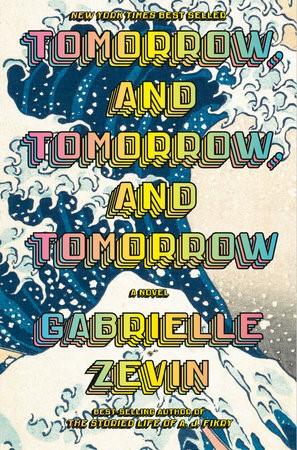★★★★☆
Gabrielle Zevin’s novel “Tomorrow, and Tomorrow, and Tomorrow” is a captivating read that is sure to warm the hearts of readers with its deep reflections on friendship and love.
The novel follows the lives of video game developers Sam and Sadie over the course of 30 years, exploring the meaning of love and dedication in the process. The novel delves into the nuances of their relationship and the themes of ambition, success and the sacrifices people make to achieve their dreams.
The story begins in Cambridge, Mass. as Sam, a Harvard University mathematics student, and Sadie, a Massachusetts Institute of Technology computer science student, bump into each other in a crowded train station. They haven’t seen each other since they first met as kids in a Los Angeles hospital, where Sam was recovering from a car accident and Sadie was visiting her sister, who was being treated for cancer.
Sam and Sadie reignite their friendship over their shared love of gaming after this chance reunion, and they start on a dream of creating a platformer that will change the gaming industry. They spend countless hours working on a new game, which they call “Ichigo,” and eventually release it to great acclaim. Sam’s roommate, Marx, joins in the success of “Ichigo” as its producer.
Sadie and Marx’s relationship becomes strained, however, as the game gains popularity. They have different visions for the future of the game, and they struggle to reconcile their differences. The novel delves into their personal struggles as well as the challenges of navigating the gaming industry and dealing with the pressures of success.
Zevin’s writing is engaging and thoughtful, and she expertly explores themes of friendship, ambition and the blurred lines between reality and video game reality. The characters are well-developed and relatable, and their experiences will resonate with anyone who has ever had a complex and long-lasting friendship.
A standout feature of the novel is the way Zevin depicts the world of video game development. Zevin clearly did her research, and the behind-the-scenes glimpses into the industry are both fascinating and eye-opening. Zevin includes just enough technical detail to give readers the necessary background to understand what a graphics engine does — but never ventures too far into the weeds. Zevin depicts the complexities of video game development with prose that is elegant and insightful, with moments of humor and poignancy throughout.
“Tomorrow, and Tomorrow, and Tomorrow” is also the name of one of the most famous soliloquies in William Shakespeare’s tragedy “Macbeth.” It comments on the restlessness of life as troops are approaching Macbeth’s castle to besiege it. When Gabrielle Zevin uses the same words, she speaks of the “possibility of infinite rebirth, infinite redemption” offered by video games. In video games, death is merely a chance to restart with a clean slate — more a symbol of hope than despair.
Contrasting its dedication to detail, the novel’s pacing is uneven. While the first half is engaging, the second half drags on, causing its plot to lose momentum. The characters’ relationship becomes unnecessarily complicated, and the story loses some of its focus as it tries to cover too many themes and subplots.
Despite the pacing issues, the novel’s characters are well written and sympathetic. Sadie, Sam and Marx are flawed and complex individuals, and their ever-changing relationship with each other represents the often overlapping dynamics of friendship, love and business partnership.
“Tomorrow, and Tomorrow, and Tomorrow” is a poignant and profound exploration of the meaning of friendship and love. Zevin’s writing combines intelligence, humor and emotion, making this a must-read for everyone — even those who are not interested in gaming.















Gail Kelleher • Oct 17, 2023 at 7:46 pm
I loved this book. I was sad when it ended. I’ve never played a video game in my life; gives me new repect for the industry.